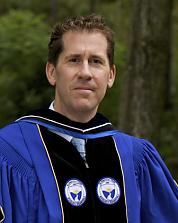Landmark College的第四任校长. 彼得一个. 伊甸园, leads the College in pursuing its mission in new degree programs and a renewed focus on the fields of science and 技术.
 彼得一个. 伊甸园,Ph值.D., took office as the fourth president of Landmark College on July 1, 2011. 科学家和研究员, he also is an accomplished educator and administrator whose passion for learning, 创新, and discovery infuses his aspirations for the College’s future.
彼得一个. 伊甸园,Ph值.D., took office as the fourth president of Landmark College on July 1, 2011. 科学家和研究员, he also is an accomplished educator and administrator whose passion for learning, 创新, and discovery infuses his aspirations for the College’s future.
A firm believer that “education is ripe for reinvention,” Dr. 伊甸园 embraces 技术 and champions the responsible integration of new 技术 in higher education. 有很强的现代科学背景, 研究, 教学与奖学金, he has been leading Landmark College into a new era of learning for college students with learning disabilities, 注意力缺陷多动症, 和自闭症.
In 2012, 学院宣布了三个新的学位课程, one that transformed the College into a four-year institution (the Bachelor of Arts in Liberal Studies), and two that demonstrate a commitment to the STEM fields: an Associate of Science in the Life Sciences and an Associate of Science in Computer Science/Gaming. 与万宝路大学研究生中心合作, Landmark College also launched a certificate program in Universal Design: Technology Integration for professionals in education, 技术, and support services and offers both online and face-to-face learning environments.
A Foundation in STEM (Science, Technology, Engineering, and Math)
自1984年成立以来, 地标学院已经认识到它的学生, 同时也有学习上的差异,比如阅读障碍, 注意力缺陷多动症, 和自闭症, also have unique strengths and talents and an ability to succeed in many different fields, 包括科学, 技术, 和数学.
The path that Landmark College forged from its founding was unique. As the first college in the country to exclusively work with students with dyslexia, 研究 and best practices for working students at the college level were scant to nonexistent. Determining the best methodologies for instruction was approached on two fronts, in the classroom and in the broader context of faculty 研究.
从一开始, Landmark shared its evolving methodologies with the educational community through its educational workshops and outreach activities which would evolve into the Landmark Institute for 研究 and 培训 (LCIRT).
Articles below reflect both the earliest efforts in working with students in the classroom and 研究 into best practices in teaching in the areas of science, 技术, 和数学 that draw on students’ strengths in the areas of creativity, 逻辑, 结构, 和感知.
灯塔 通讯
灯塔 was Landmark College's newsletter from 1985 – 1991.
1988年6月
编程与失读症学生:计算机科学102
Reviews the reasons learning computer programming could be helpful for students with dyslexia and the way it was taught to students in the earliest days of the College.
1989年12月
Landmark如何教诵读困难的人数学
Explores the reasons students with dyslexia struggle with math and presents the framework for learning in the math classroom in Landmark's earliest years.
具有里程碑意义的链接 通讯
具有里程碑意义的链接 was the College's newsletter from 1991 – 2011.
2000年9月
Senator Honored, Helped Landmark Earn Title VII Grant; College Awarded Title III Grant
A pair of articles describe the College's work with Senator James Jeffords efforts to amend the Higher Education Act to benefit individuals with disabilities and the awarding of two separate, 竞争激烈的补助金.
2000年12月
NSF资助新生物学课程
描述了425美元的奖金,000 three-year grant to develop an Introduction to Biology course using Universal Design techniques.
2001年秋季
新研究所将扩大Landmark的研究能力
Announces the creation of LCIRT and results of Title III funded 研究 exploring the use of text-to-speech assistive 技术 with students with 注意力缺陷多动症, which was presented at the International Dyslexia Association Conference.
 2003年秋
2003年秋
生物学的成功! Landmark的创新手册
Describes the goals and execution of the National Science Foundation project as the biology manual nears completion.
2006年秋
LCIRT补助金更新
Discusses a funding request to the National Science Foundation that focused on the accessibility and usability of math software by college students with learning disabilities. (The NSF did fund the grant after the publication of this article.)
2008年冬
2007年世界可用性日会议
Profiles the third in a series of annual conferences cohosted with Dartmouth College on the applicability of Universal Design in teaching and learning.
2011年冬
Landmark Assesses Technology Education Needs at Community Colleges
Presents LCIRT’s work with three community colleges to develop a curriculum for 技术 educators working with students with learning differences in the STEM fields.